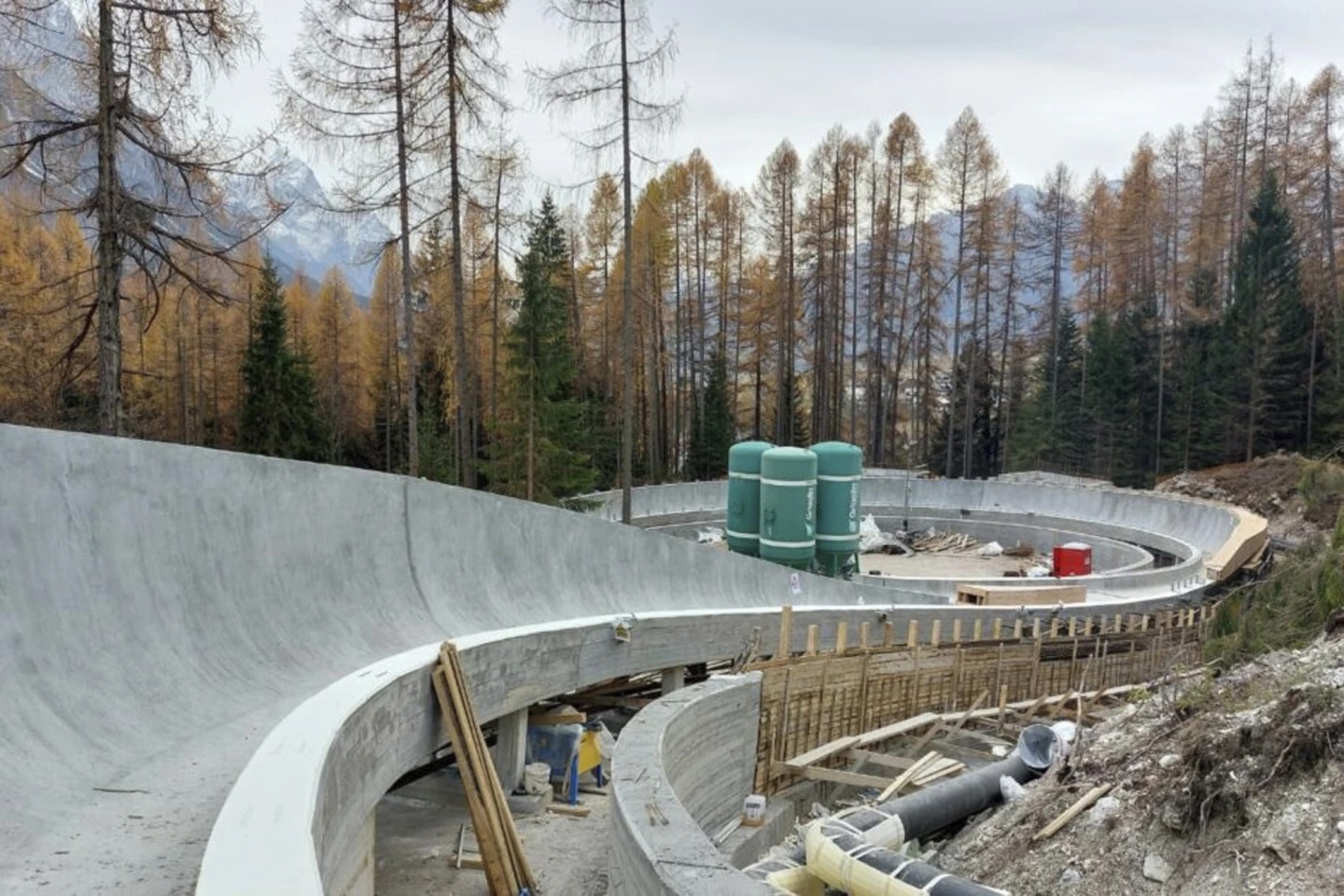
One year from today, the international sports world will descend upon the San Siro in Milan for the Opening Ceremony of the 2026 Olympic Winter Games.
In the next 365 days, the International Olympic Committee will undergo a generational amount of movement with new leadership ahead of Italy and face a host of substantial issues surrounding future hosts and its own financial health. With an eye on the age of transformation ahead, here are some storylines that we’re watching.
The Countdown Continues to Milan-Cortina 2026
The biggest storyline about a Games organized in Italy at this point is that multiple events may be heading to the Adirondack region in New York State.
Lake Placid, New York, could be the host for bobsled, luge and skeleton at the 2026 Olympic Winter Games should the sliding venue in Cortina not be completed by March. The Cortina track is claimed to be nearly three-quarters complete ahead of a test event that is crucial to a final decision on where events will be organized.
Having Lake Placid as a backup instead of closer tracks in Austria or Switzerland was a local organizing committee decision and “we chose Lake Placid because it was the only place where they offered us the track without requiring us to make any investments,” Milan-Cortina Chief Executive Officer Andrea Varnier told The Associated Press. “But we’re counting on holding the sliding sports here in Cortina.”
Added organizing committee president Giovanni Malagò: “It’s just a formality. There’s no substance to it.”
Well, if there was no substance, then there wouldn’t be a backup plan, would there?
There’s also a joke to be made that given the distance between some of the venues for 2026, the mileage between Milan-Cortina and Lake Placid fits into the overall planning for the venues.
Milan (ice hockey, figure skating, speedskating and short-track speedskating) and Cortina d’Ampezzo (women’s alpine skiing, curling and potentially sliding) are separated by about 170 miles. Alpine skiing for the men in Bormio is more than 125 miles from Milan and nearly 200 miles from Cortina. Athletes will compete in three other mountain clusters, while the Closing Ceremony will be held in Verona, the largest city in the northeastern Veneto region.
And while so much attention has been paid to the sliding venue, a bit less publicized is that the main hockey venue in Milan is not set for completion until the fall and construction on a temporary athletes village outside Cortina is also incomplete.
Keep in mind, however, that a rush to finish Games preparations is nothing new — shower water ran yellow for some early arrivals to Sochi in 2014 and preparations for Rio 2016 were labeled the “worst” ever by an IOC vice president.
The Presidential Race
When Milano-Cortina gets underway in a year, it will be the biggest moment for the then-new tenure of whoever will become IOC President with Thomas Bach standing down in late June. The election will be March 20 after each of the seven candidates had about a quick Zoom’s call worth of time to present their case to IOC membership in a process that many find underwhelming.
There’s a clear split for three candidates that are considered potential winners: Sebastian Coe, Juan Antonio Samaranch Jr. and Kirsty Coventry. Coe and Coventry are Olympic gold medalists; Samaranch Jr.’s father was the longtime IOC leader during its transformative era into becoming a marketing juggernaut.
Olympic observers regard Coe has the most qualified, although the IOC (despite its insistence of neutrality) has made enough comments critical of Coe’s move at World Athletics to pay Olympic medalists that many believe Bach would prefer Coe not succeed him. The conventional wisdom is that Bach prefers Coventry, who would be the first female IOC president. But Samaranch Jr. is seen by insiders as the slight favorite at this point.
Whoever succeeds Bach will have the Milan-Cortina issues first, plus sponsorship deals winding down and broadcast deals that are up after 2032 (the NBC deal single-handedly propels a lot of IOC business). They will also have a membership that ever so slightly has shown indications of chafing under Bach’s style of business and would like to have a broader say in the future of the Olympic movement, particularly in regard to future Games host sites.
The State of LA 2028 Preparations
The 2028 Olympic and Paralympic Summer Games in Los Angeles have long been billed as a turnkey operation with venues in place and plans for a “no-car Games” as the local organizing committee switched into operational mode post-Paris.
The Games are more than three years away but given the massive rebuilding of housing and infrastructure to come throughout the Los Angeles region after the devastation wrought by a series of wildfires, there has been concern as to whether rebuilding would affect future Games plans that depend on state and local governments for police, fire, first responders and traffic control.
Another question is the remaining venue announcements for sports that have not been given sites; industry sources tell SportsTravel an announcement is scheduled for early April. Fencing, judo, table tennis, taekwondo and wrestling are scheduled to be at the Los Angeles Convention Center with an expansion and modernization project scheduled to be finished before 2028; those plans are in deep doubt because of the wildfires, the Los Angeles Times reported this week.
Then there are the venue changes that have been announced, including plans to have softball and canoe slalom in Oklahoma City, Oklahoma. That, plus the move of basketball from downtown Los Angeles to Inglewood’s Intuit Arena and other sports moving both out of and into Los Angeles require written consent from the city council, which was reviewing the proposal in the fall. Given circumstances, a delay in that review and consent would certainly be understandable.
Then there was Wednesday’s news that President Donald Trump signed an executive order intended to ban transgender athletes from participating in girls’ and women’s sports, then said he had empowered Secretary of State Marco Rubio to make it clear to the IOC that “we want them to change everything having to do with the Olympics and having to do with this absolutely ridiculous subject.”
The IOC has deferred to international federations for each sport on transgender participation. Of the candidates to replace Bach as president, Coe has been a strong proponent of limiting participation in female sports to cisgender women. The IOC as a international sporting body, however, does not like government interference.
The Games Beyond 2028
But wait — there’s more!
The 2030 Winter Games in France was rushed through approval during last summer’s IOC Session in Paris and government guarantees, normally a deal-breaker for the IOC, were forgiven to a later date. In the wake of a great Games in Paris, the Olympic glow in the country has worn off as much as some of the Olympic medals.
The 2030 Games is on the tightest timeline of any future Games from approval to organization and organizers’ plans were thrown this week when biathlon star Martin Fourcade withdrew his candidacy to be president of the organizing committee, due to be announced later this month.
“There are still too many differences of opinion to be able to contemplate this mission calmly,” Fourcade wrote in an email to the members of the future executive committee of the 2030 Games seen by The Associated Press.
Then there’s the 2032 Summer Games in Brisbane. Former Queensland premier Annastacia Palaszczuk, who played a pivotal role in securing the Games, said in January that plans had become a “hot mess.” Concerns at various points over venue redevelopment had in part led to Palaszczuk’s resignation as premier in December. The new leadership in Queensland says claims it uncovered a “massive budget black hole” to build the athlete villages.
“If I were at the IOC right now, I’d be saying: ‘What is going on Brisbane?’” Palaszczuk said last month.











 Copyright © 2025 by Northstar Travel Media LLC. All Rights Reserved. 301 Route 17 N, Suite 1150, Rutherford, NJ 07070 USA | Telephone: (201) 902-2000
Copyright © 2025 by Northstar Travel Media LLC. All Rights Reserved. 301 Route 17 N, Suite 1150, Rutherford, NJ 07070 USA | Telephone: (201) 902-2000